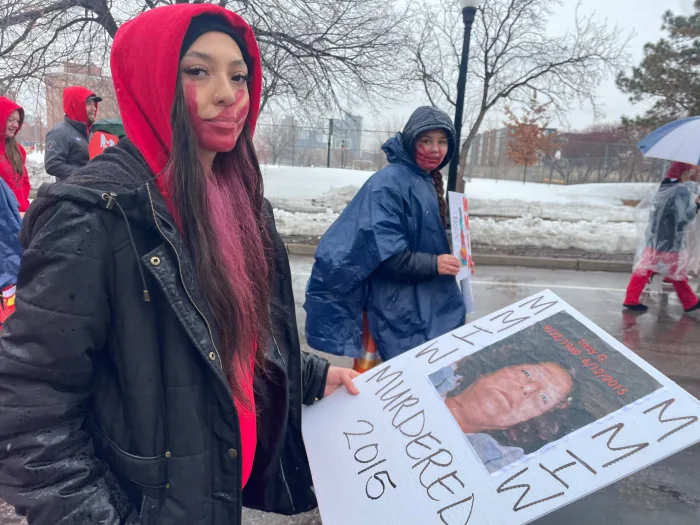March for missing and murdered Indigenous relatives draws hundreds
Grace Deng
Minnesota Reformer via ICT

Protestors at a rally for missing and murdered Indigenous relatives. (Photo by Grace Deng,Minnesota Reformer)
‘Every person here can probably name someone’
Hundreds of people gathered at a rally for murdered and missing Indigenous relatives in Minneapolis on Tuesday, Feb. 14 — many of whom said they had loved ones who were murdered or missing.
“It’s not new to anybody. It’s ‘Who is it this week?’ Who is it today?’” said Stephanie Skinaway, a citizen of Red Lake Nation and Mille Lacs Band of Ojibwe, adding: “Every person here can probably name someone.”
Skinaway, who comes to the march every year, said her cousin and aunt have both been killed. The cousin’s murderer was never caught. The man who killed her aunt was sentenced to just three years in prison, she said. Skinaway said she was almost kidnapped three times: The first time it happened when she was 15-years-old.
In Minnesota, Indigenous women comprise 1% of the state’s population — but they’re seven times more likely than white women to be murdered, according to a state report, which also found that lack of media coverage and inadequate response from law enforcement contribute to the crisis.
Minnesota created an Office of Missing and Murdered Indigenous Relatives last year to provide resources for Indigenous people searching for their loved ones.

Nationally, murder is the third leading cause of death for Indigenous women, according to the Center for Disease Control and Prevention. A report from the National Institute of Justice found more than 4 in 5 Indigenous men and women have experienced violence in their lifetime.
Paulina Gregg, a citizen of Lower Sioux Indian Community, said her aunt, Lizzy Gregg, was murdered in 2015. Gregg said she and her community won’t stop advocating for justice until they receive it.
“We’re still here,” Gregg said. “Even after they tried to eliminate us.”
Lester Johnson, a citizen of Crow Creek Sioux Tribe, said his cousin, Amy Thompson, was murdered in 2021 and her body was found hidden under a mattress. The coroner’s office said her body was there for three or four weeks. Johnson drove from South Dakota to attend the protest.
“I would’ve hugged her a lot longer,” Johnson said. “I just pray no other family has to go through this.”
Lorna Dow of the Lower Sioux Indian Community said her son, Mato Dow, has been missing since 2017. Dow wants people to know her son was a loving father of two daughters: Shankay, 13, and Avery, 7, who were at the march. When their father disappeared, the girls were just 7 and 1.
Dow is suing Redwood County for mismanaging her son’s case.
“I just want closure,” Dow said.
Speakers at the rally included Sen. Mary Kunesh, a New Brighton Democrat, and Reps. Jamie Becker-Finn, a Roseville Democrat, Heather Keeler, a Moorhead Democrat and Alicia Kozlowski, a Duluth Democrat. Lawmakers in attendance pushed for more funding for the Office of Missing and Murdered Indigenous Relatives. Other proposals in the Legislature include creating license plates to fund the office’s work and offering reward funds to encourage tips on cold cases. Lt. Gov Peggy Flanagan, White Earth Band of Ojibwe, was expected to attend but did not show.
Minneapolis Mayor Jacob Frey attended but was booed out of the rally. Protestors confronted him about the city of Minneapolis’ plan to demolish a warehouse in East Phillips — which is known to be contaminated with heavy metals — that community members wanted to turn into an urban farm and community space. Little Earth, a housing complex that serves mostly Indigenous people, is near the site.
Little Earth resident Nicole Perez told Frey, “You sit and lie to our peoples’ face and said you would support us.”
This article was first published in the Minnesota Reformer.

